Title: Georgetown Remembers Revered SFS Dean Carol Lancaster
The university remembers Carol Lancaster, the former School of Foreign Service dean, who died today and was near and dear to the hearts of countless Georgetown students, faculty, alumni and staff.
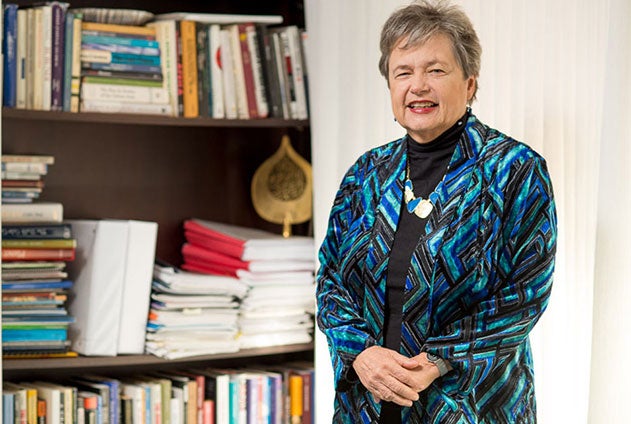
OCTOBER 22, 2014COUNTLESS COLLEAGUES, ALUMNI, FRIENDS and family are mourning the loss of Carol Lancaster, a Georgetown alumna, beloved longtime faculty member and former dean at the School of Foreign Service (SFS).
Lancaster (SFS’64), who spent more than three decades at Georgetown and became SFS dean in 2010, passed away early this morning after being diagnosed with a brain tumor in November of 2013. She was 72.
“This is an extremely sad day for our community,” said Georgetown President John J. DeGioia. “Carol’s presence on our campus for the past three and half decades – and before that, during her time as a student here – was nothing short of a gift. Her extraordinary passion for this place, for her students and their growth, for the School of Foreign Service, and for our role both in Washington and around the world was inspiring and pushed us all to be better versions of ourselves. This legacy is one that will live on in all she touched.”
“There was an extraordinary depth and expansiveness to Carol’s caring for the people and world around her – whether for her students, the Washington, D.C., community or our global family,” he added. “She devoted great care, passion and wit to helping others make a difference and to making an impact herself through scholarship, public service and the cultivation of partnerships. We feel this loss acutely and continue to keep her family in our thoughts and prayers.”
HEART AND INTELLECT
Lancaster worked as a member of the U.S. Department of State’s policy planning staff from 1977 to 1980 and then served as deputy assistant secretary of state for Africa at the State Department from 1980 until 1981, when she came to SFS as a research professor and later became director of the African Studies program.
J. Brian Atwood, who was nominated and confirmed as USAID administrator in 1993, asked Lancaster to be deputy administrator of the organization that year, a post she held until 1996, when she returned to the university.
“Carol was a wonderful alter ego as my deputy at USAID,” said Atwood, who was USAID administrator from 1993 to 1999. “She was not only a development professional; she knew the State Department and Capitol Hill as well. More importantly, she was a trusted friend, someone whose heart was as large as her intellect. I will sorely miss her warm personality, her wry sense of humor and her insights into the worlds of politics, government and academia.”
Lancaster met Robert Gallucci, who served as SFS dean from 1996 to 2009 and recently returned to Georgetown as Distinguished Professor in the Practice of Diplomacy, during her first position at the State Department.
SWEET SPOT
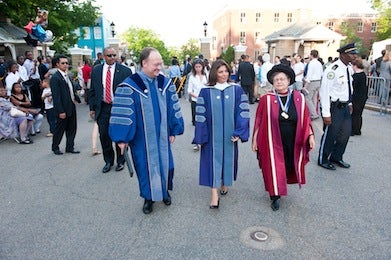
Georgetown President John J. DeGioia, left, walks with then-Costa Rica President Laura Chinchilla Miranda (G’89) and then-SFS Dean Carol Lancaster during 2011 Commencement Exercises.
“Carol and I had been friends and colleagues for 35 years,” Gallucci said.
He said he “depended upon her advice and good judgment from the start of my tenure,” and was “never disappointed by her sense for the sweet spot in academic excellence and policy relevance.”
“When she was selected to follow me as SFS dean,” Gallucci added, “I knew that the school was in good hands and that it would continue to grow in scope and excellence under her guidance, as it clearly has.”
A CONCERNED SCHOLAR
Lancaster’s scholarly work comprises 10 books, includingForeign Aid: Diplomacy, Development, Domestic Politics(University of Chicago Press, 2007) andTransforming Foreign Aid: United States Assistance in the 21st Century(Institute of International Relations, 2000), as well as numerous articles on foreign policy, the politics of foreign aid and the politics of development.
She also was working on an edited volume,Politics of Developmentfor Oxford University Press, and a book,Barack Obama’s Foreign Aid for the Center for Global Development.
Another book about Washington, D.C., that chronicled both the history of the city and her personal history also was in the works.
SIX LANGUAGES
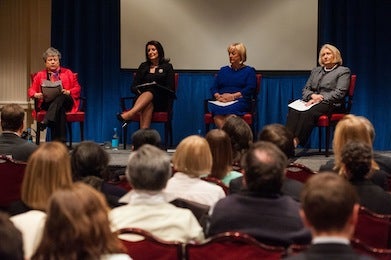
SFS Dean Carol Lancaster, left, serves on a panel with Kosovo President Atifete Jahjaga; Monica McWilliams, former chief commissioner of the Northern Ireland Human Rights Commission; and Melanne Verveer, executive director of the Georgetown Institute for Women, Peace and Security.
During her lifetime she mastered six languages – Spanish, French, German, Portuguese, Russian and Arabic. She traveled all over the world and had friends and former students on nearly every continent.
Edward P. Brynn (SFS’64), an SFS board of visitors member, was ambassador toGhana from 1995 to 1998.
“ ‘Loosen up!’ ” he remembers Lancaster telling him. “ ‘You are a witty guy and this worrying about grades and career direction is all an unnecessary distraction!’ ”
Brynn said when Lancaster came to Ghana, she looked out the window in the ambassador’s residence and said, “ ‘obviously you stopped worrying.’ ”
ENRICHING AFRICAN LIVES
“That’s the line I remember most,” Brynn said.
Another close friend was Anthony Lake, the former National Security Advisor under President Bill Clinton who now serves as executive director of UNICEF. Lancaster worked under him in her first position with the State Department.
“She spent her life enriching the lives of her family, her friends, her students and colleagues, and, with her pen, her work and her heart, the lives of people in Africa,” Lake said.
PATH-BREAKING WORK
The Georgetown dean traveled with Vital Voices to Guatemala, to Ethiopia with the Aspen Institute and had spent time in Africa, Latin America, Russia, Japan and China.
“I first met Carol in 1991, when I worked on African democracy issues at USAID, and we became fast friends when she became deputy administrator,” said former SFS Associate Dean Jennifer Windsor. “Even after her brain surgery, she talked about the atrocities in the Central African Republic and pondered out loud the nature of evil and how we best counter it.”
“Her books and articles on foreign assistance were path-breaking in that they examined the political influences on foreign aid decision-making, including in countries like Japan and China, where information was limited and closely held,” Windsor added.
In her last months as dean, Carol had embarked on a new initiative on ethics.
She “grappled with what it means to be an ethical person, and convened groups to think about how the school and university could better incorporate ethical thinking and decision-making inside and outside the classroom,” Windsor said.
SOMETHING SPECIAL
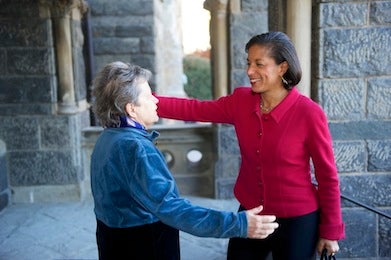
SFS Dean Carol Lancaster greets U.S. National Security Advisor Susan Rice before Rice’s address in Gaston Hall this past November.
Lancaster had consulted for the United Nations and the World Bank and she served on the boards of the Institute for the Study of Diplomacy, Vital Voices, the Society for International Development, the American University of Afghanistan, the Center for International and Regional Studies (SFS-Q), and the advisory board for the Center for Global Development.
A member of the American Political Science Association, International Studies Association and the Council on Foreign Relations, Lancaster also had been a Carnegie Fellow, a fellow of the American Council of Learned Societies and a visiting fellow at the Institute for International Economics and the Center for Global Development.
“As a Hoya and then a long-standing member of the faculty, Carol brought something special to her time as dean of the School of Foreign Service, and she was loved for that,” said Jeffrey Anderson, SFS’ Graf Goltz professor and director of the faculty. “She made lasting contributions to the school and the university, and her leadership and bright personality will be sorely missed among the faculty.”
James Reardon-Anderson is interim SFS dean.
“Carol Lancaster has been a great dean and colleague, always open, supportive and generous,” he said. “I will miss her both as a friend and as a dean. She was a wonderful example in both ways for me and for all of us.”
A PIONEERING WOMAN
Barely 5 feet tall, she and Chester Gillis, the 6’3” Georgetown College Dean, were good friends.
“Carol and I were very close, not only because we worked together but also because we genuinely liked each other,” Gillis said. “Carol always called meDecanus Maximus, because I am tall and the dean of the oldest school at Georgetown, and I called herDecana Minimabecause she was so diminutive.”
“A dean could not have asked for a dearer and more supportive friend and colleague than Carol,” he added. “Her love for Georgetown and its students inspired me. Her wisdom guided me. Her friendship sustained me. Georgetown will go on, but it will not be quite the same without Carol’s leadership.”
Katherine Marshall, an SFS visiting professor and senior fellow at the Berkley Center for Religion, Peace and World Affairs, worked with Lancaster on a course that linked disciplines and approaches in politics, culture and religion.
“Carol Lancaster was one of the pioneering women in international affairs who, through the 1970s, 1980s and 1990s, broke glass ceilings, pushed open doors and helped new generations of women to develop and thrive in places and roles that had been proudly and exclusively male,” Marshall said. “She showed that a woman executive and thinker could be as tough-minded and as demanding as any man.”
Rosemary Kilkenny, Georgetown’s vice president for institutional diversity and equity, said she knew the former dean for more than 30 years.
“I feel fortunate to have had her as a friend and confidante raising our two sons, now 30 years old, while we were both juggling motherhood and a career,” Kilkenny said. “Carol not only loved the country where she found peace and joy, she also loved Georgetown as a student, alumna, teacher and ultimately as dean. … I will always remember her fast-talking humorous tales about her fantastic trips around the world. I will always cherish her friendship and will miss her dearly.”
INDOMITABLE SPIRIT
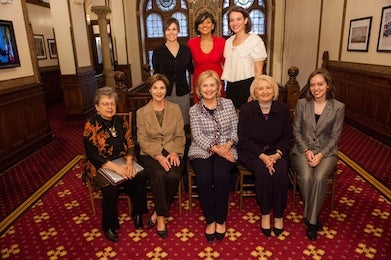
SFS Dean Carol Lancaster, left, sits with former First Lady Laura Bush, former U.S. Secretary of State Hillary Rodham Clinton, GWIPS executive director Melanne Verveer and other members of the GIWPS staff.
During her tenure as dean, which began in 2010, Lancaster successfully launched two new master’s programs, inGlobal Human DevelopmentandAsian Studies.
She also raised funds for and oversaw the creation of theGeorgetown Institute for Women, Peace and Security(GIWPS). Lancaster hired Ambassador Melanne Verveer, an alumna and former director of the U.S. State Department’s office for Global Women’s Issues, as the institute’s first director.
“Carol was my friend, colleague and fellow Hoya for many years,” Verveer said. “She was a brilliant academic who understood that a university must imbue critical thinking in students but also create global citizens. I admired Carol’s indomitable spirit and her tireless efforts to improve the lives of the world’s most downtrodden. She was a fierce champion of women’s leadership.”
A FIRST LADY’S TRIBUTE
Former Secretary of State Hillary Rodham Clinton, the honorary founding chair of GIWPS, announced the creation of the institute when she launched theU.S. National Action Plan on Women, Peace and Securityat Georgetown in 2011.
While at USAID, Lancaster traveled with Clinton to various parts of the developing world, and became friends with Verveer in the process.
“I am deeply saddened by the passing of my friend and colleague, CarolLancaster,” Clinton said. “During my time as First Lady, I had the great privilege of working and traveling with Carol while she served as deputy administrator of USAID. Carol’s commitment to diplomacy and development continued through her scholarship and leadership at Georgetown University. In her passing, the world has lost a true champion for human development and women’s progress.”
Lancaster also worked with Madeleine Albright, who served as U.S. Secretary of State from 1997 to 2001, began teaching at Georgetown in 1981.
IMPORTANT FORCE
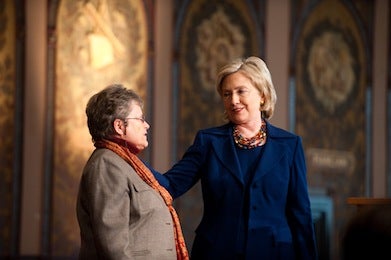
“During my time as first lady, I had the great privilege of working and traveling with Carol while she served as deputy administrator of USAID. Carol’s commitment to diplomacy and development continued through her scholarship and leadership at Georgetown University. In her passing, the world has lost a true champion for human development and women’s progress,” said former U.S. Secretary of State Hillary Rodham Clinton.
“Carol Lancaster was a good friend and colleague,” said Albright, now the Mortara Distinguished Professor of Diplomacy at Georgetown. “A longtime public servant, professor and dean, Carol was an innovator in the field of international development and made an indelible contribution to American foreign policy.”
“In her work, she made clear the important force for good the United States must play in the world,” Albright added.“As a teacher, she translated her enthusiasm by engaging young minds and encouraging her students to be global citizens. It is an honor to have known Carol and worked with her both in government and at Georgetown University. I will miss her, as will the foreign policy community, her faculty and especially her students.”
The SFS’s board of visitors has raised funds for aCarol Lancaster scholarshipthat will support a graduate student in the SFS Global Human Development program, one of her signature initiatives.
CHERISHED AND RESPECTED
“It is impossible to calculate the impact that Carol has made on the School of Foreign Service, not just as dean and a professor for more than three decades, but also as a cherished and respected member of the Georgetown community,” said Paul Pelosi (SFS’68), chair of the SFS board of visitors and husband of Rep. Nancy Pelosi (D-Calif.).
For several years, Lancaster co-taught a course with DeGioia.
“I had the great privilege of teaching a course on ethics, globalization and development with Carol from 2005-2008,” the president said, “and witnessed firsthand her passion for, and unparalleled understanding of, the dynamics and questions framing human development today.”
Her colleagues note that she had such a passion for academia that last summer she informed DeGioia of her decision not to seek a second term as dean in order to focus on teaching and research.
TOUCHING MANY LIVES
Gail Griffith (SFS’72, G’81), SFS director of external relations, said Lancaster touched the lives of countless individuals.
“Her unassailable moral compass, her directness and her smart sense of humor drew people to her,” Griffith said. “She was magnetic. As my friend and mentor, not only did I want to be with her, I wanted tobeher.”
Born during World War II in Washington, D.C., to a family without means, Lancaster was a lifelong resident of the city.
“My parents married in the 1930s and moved to Southeast Washington – neighborhoods of primarily working class families then and now,” she wrote. “As a child, I remember the city as a place of monuments, museums, department stores and the YWCA…”
FIRST-GENERATION STUDENT
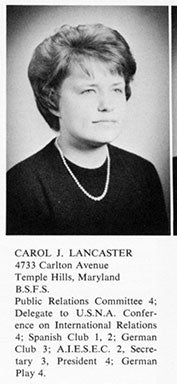
The first in her family to attend college, she was what used to be called a “day hop” student, living at home and attending classes on campus.
“I attended college at Georgetown University during the turmoil of the 1960s when the Vietnam War and civil rights divided parents from children and fed many demonstrations in downtown Washington and fights over the dinner table – it was a time of political activism and anger,” she wrote. “…After nearly a decade as a student in Europe and Latin America, I returned to Washington in the 1970s to work for government for over a decade and later, to teach at my alma mater.”
She was a federal budget examiner in that decade, then received a Congressional fellowship and worked for then-Sen. Dick Clark (D-Iowa) and then-Rep. David Obey (D-Wisc.).
“[Carol] epitomized excellence day after day in government and in academia,” Obey said. “Working in Congress, in the State Department, in USAID or in the classroom, she demonstrated a hard-nosed, fact-based practicality that turns good intentions into good results. Few people in the general public knew her name but she has been one of those people who gives public service a good name. I learned a lot from her and very much regret her passing.”
After Lancaster graduated from Georgetown, she won a Fulbright to Bolivia.
TRANSFORMATIVE EXPERIENCE
“Her mother thought she should come home after she earned her degree and get a job,” Griffith said. “Her parents were baffled – they couldn’t really place where Bolivia was, nor did they know what a Fulbright was.”
Windsor said Lancaster described her time studying at the Universidad de San Andres in La Paz, Bolivia, “the most transformative experience” of her life.
“Lancaster recounted stories of traveling around the country and region in buses and by train, undaunted and unafraid to engage all sorts of people,” Windsor noted. “Her curiosity extended to everyone and everything.”
LARGE EXTENDED FAMILY
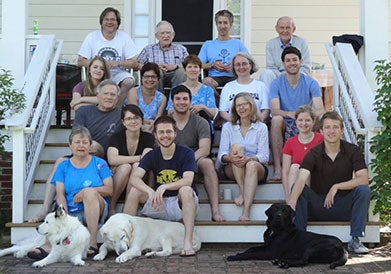
Dean Carol Lancaster (far left corner, first row) with her dog, Molly, at her feet in July 2013 at her family’s farm in Madison, Virginia. Her husband, Curtis Farrar, is pictured second from left, fourth row. Her son, Douglas Farrar (SFS’05, G’12) is in the first row, far right corner, with his wife, Katie (Killoren) Farrar, sitting on the step behind him. Lancaster’s four stepchildren, are Andrew Farrar (far left, fourth row), Erin Farrar (middle, third row), John Farrar (far left, second row) and Cynthia Farrar (far right, second row).
The young woman who graduated from SFS in 1964 went on to earn a Ph.D. in 1972 at the London School of Economics and Political Science. Her first marriage to Mehdi Ali ended in divorce,andLancaster married Curtis Farrar, who survives her, in 1980.
Her son, Douglas Farrar (SFS’05, G’12), is a congressional associate with the Aspen Institute in Washington, D.C.
“My mom was a brilliant and talented woman, yet what I will remember most is her humility and kindness,” he said. “She genuinely cared for others –it made her a special person and a wonderful mother.I hope everyone whose lives she has touched will cherish, as I will, the memories of moments they have shared with her.”
In addition to her husband and son, Lancaster is survived by four stepchildren, Cynthia, John, Erin and Andrew Farrar, seven grandchildren and a daughter-in-law, Katie (Killoren) Farrar.
“I found at first a city still scarred by the race riots of the late 1960s,” Lancaster wrote in her book. “But by the 1980s, the pace of renewal in Washington had picked up to create what is now the vital city that this book celebrates. …At least my son – a fourth generation Washingtonian – can live and work in and enjoy this extraordinary place.”
After alumni heard that Lancaster had brain cancer, they flooded a tumblr sitededicated to her recovery.
“You define the SFS, and it is not the same without you,” a poster named Annie wrote. “You are held high in the thoughts of so many.”
SCHOLAR, COOK, GARDENER, MUSICIAN
A voracious reader, Lancaster would “one day be reading about Japanese foreign assistance policies and the next about the brain’s evolving elasticity or the latest philosophical thinking,” according to Windsor.
She loved cooking and gardening, whether at her home in Dupont Circle or what she and her family called her “farm” in Madison County, Virginia, where she had an extensive vegetable and herb garden. She loved the companionship of her dog, Molly.
Lancaster also was very fond of music and learned to play the Celtic harp.
A WASHINGTON LOVE LETTER
The longtime faculty member and alumna’s devotion to her students and passion for teaching was legendary. She once obtained an online ordination certificate just so she could preside over the marriage of two former students.
She had hoped to complete her treatise on Washington before she died and referred to the book as her “love letter” to the city.
“I have written a book about a city that in some profound sense owns me,” she wrote. “I present the city from my perspective as middle class white professional who celebrates this place because of family and familiarity, because I am interested, amused, annoyed and sometimes inspired by the political theater and intellectual life of Washington, because of the diverse and vibrant culture life of the city and its expanding amenities and because of its natural beauty which often – and sometimes unexpectedly – claims my attention and calms my soul.”
Memories and tributes to the late former dean may be posted to thisDean Lancaster memorial tumblr site.